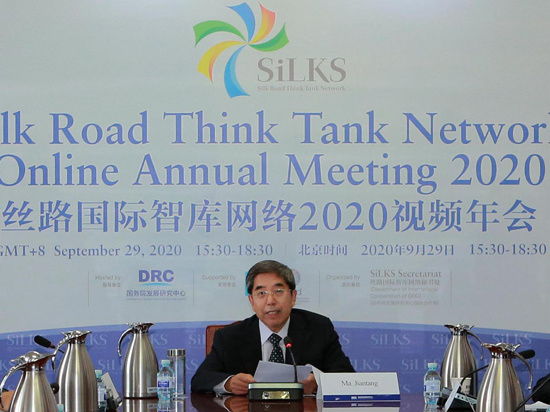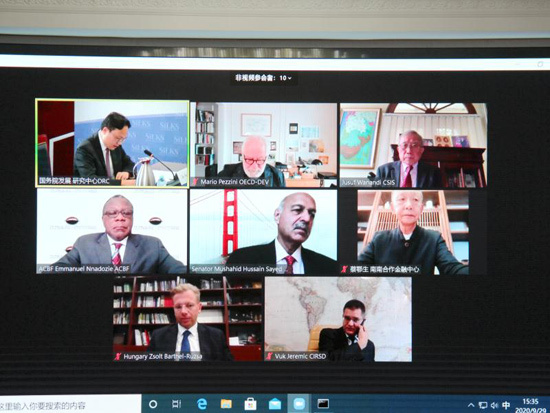
Ma Jiantang, secretary of the Leading Party Members' Group of the Development Research Center of the State Council, calls for enhancing policy consultation and coordination among conuntries at the virtual annual meeting of the Silk Road Think Tank Network (SiLKS). (Photo: China Daily)
As the COVID-19 pandemic continues to threaten the globe, the world economy has fallen into a serious recession. Despite this time of crisis, the development of the Belt and Road Initiative has not ceased.
Instead, from January to August, China’s trade volume with countries involved in the BRI grew by 0.5 percent year-on-year to $860 billion. In August, 1,247 China-Europe freight trains carried 113,000 TEUs (20-foot equivalent units) of goods, up 62 percent and 66 percent year-on-year respectively.
Against such a background, promoting the BRI in the post-pandemic era will be of great significance for boosting global economic recovery and sustainable growth, said Ma Jiantang, secretary of the Leading Party Members' Group of the Development Research Center of the State Council (DRC), at the annual meeting of the Silk Road Think Tank Network (SiLKS), held online on Sept 29.
“It is time for think tanks to play a positive role in promoting people-to-people exchanges, increasing the sharing of knowledge and expertise, and deepening cooperation,” said Ma.
The annual meeting, attended by more than 30 representatives from SiLKS member think tanks, discussed and revised the “Silk Road Think Tank Network Guiding Principles” and accepted four new members -- the United Nations Conference on Trade and Development, the United Nations Economic Commission for Africa, the African Capacity Building Foundation (ACBF), and the Policy Studies Institute of Ethiopia.

The SiLKS Virtual Annual Meeting 2020 is attended by representatives from more than 30 think tanks and international institutions. A joint initiative was issued, calling on members to work together to combat the pandemic and build a global community of health for all. (Photo:China Daily)
The meeting also elected a new Steering Committee, co-chaired by Ma Jiantang and Jusuf Wanandi, co-founder of the Indonesian Center for Strategic and International Studies.
Participants from across the world agreed to strengthen policy consultation and coordination on issues such as debt and financing, green development, inclusive development, third-party market cooperation and technological innovations, thus building more consensuses among countries.
An joint initiative has been issued at the end of the virtual meeting. The statement calls for all member think tanks and partners to work together to score a global victory over the pandemic and jointly build a global community of health for all.


